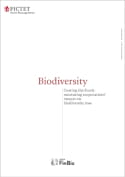Costing the Earth: measuring corporations' impact on biodiversity loss
Investors can no longer afford to ignore the devastating economic effects of biodiversity loss, but they need better tools to contain the risks. This is where the new scientific research undertaken by the MISTRA FinBio programme can help.
The world cannot afford to lose any more of its natural capital.
Evidence shows that the companies most dependent on natural resources – whether that’s the plants used to develop medicines or the insect pollination essential for agriculture – face the prospect of higher capital costs.
Measuring the impact of biodiversity loss on investors' portfolios, therefore, is a crucial consideration for investors. But it is a complex undertaking. The tools currently available to assess and monitor such risks – all of which have the potential to affect investment returns – are not advanced enough.
Businesses and investors cannot afford to disregard biodiversity loss as a risk factor. It is already a material financial variable, affecting the way firms conduct their businesses and how investors allocate their capital.
To guide investors’ efforts, we introduce the new research undertaken by scientists in the MISTRA Finance to Revive Biodiversity programme – of which Pictet Asset Management (Pictet AM) is a founding partner. The team has devised a prototype biodiversity loss measurement tool – the Earth System Impact (ESI) model - that seeks to give a far broader assessment of environmental impacts.
While still in development, the framework can already reveal a more comprehensive set of findings than what could be derived from analysing a company or industry’s own disclosures.
For example, researchers applying the model to the mining industry found that carbon emissions were the main source of environmental damage for only half of the mines analysed, while land disruption emerged as the primary driver of degradation for 40 per cent of them.
We also showcase Pictet AM’s own proprietary biodiversity impact model and discuss the ways in which we seek to draw on the insights from the ESI tool to further enhance our investment framework.

Costing the Earth: measuring corporations' impact on biodiversity loss
Download the white paper
In brief
- Financial markets are beginning to discount risks from biodiversity loss, with companies most dependent on ecosystems facing the prospect of lower valuations and higher capital costs.
- Existing biodiversity impact calculation methods are not advanced enough. We believe the Earth System Impact (ESI) model breaks new ground by accounting for key biosphere-atmosphere interactions that are essential for planetary health.
- The ESI tool already reveals a more comprehensive set of findings than investors get from standard corporate disclosures. Companies and investors could use the ESI model to identify environmentally problematic sites and investments and set targets to reduce their biodiversity impact over time.
Pictet Asset Management and FinBio
Pictet AM is representing the global asset management industry as an “Impact Partner” in the MISTRA Finance to revive Biodiversity (FinBio) programme, geared to helping the financial industry develop strategies to protect natural capital and halt biodiversity loss.
The initiative, which receives approximately EUR5 million in research funding from MISTRA (the Swedish Foundation for Strategic Environmental Research), is overseen by the Stockholm Resilience Centre (SRC) at Stockholm University.
As the Impact Partner, Pictet AM is providing investment expertise and contributing to transdisciplinary research that seeks to bring about nature-positive changes in the financial system. The partnership includes other consortium members including the UN Principles for Responsible Investment, the Finance for Biodiversity Foundation, the University of Oxford and Stanford University.
More details can be found at https://finbio.org







Important legal information
This marketing material is issued by Pictet Asset Management (Europe) S.A.. It is neither directed to, nor intended for distribution or use by, any person or entity who is a citizen or resident of, or domiciled or located in, any locality, state, country or jurisdiction where such distribution, publication, availability or use would be contrary to law or regulation. The latest version of the fund‘s prospectus, Pre-Contractual Template (PCT) when applicable, Key Information Document (KID), annual and semi-annual reports must be read before investing. They are available free of charge in English on www.assetmanagement.pictet or in paper copy at Pictet Asset Management (Europe) S.A., 6B, rue du Fort Niedergruenewald, L-2226 Luxembourg, or at the office of the fund local agent, distributor or centralizing agent if any.
The KID is also available in the local language of each country where the compartment is registered. The prospectus, the PCT when applicable, and the annual and semi-annual reports may also be available in other languages, please refer to the website for other available languages. Only the latest version of these documents may be relied upon as the basis for investment decisions.
The summary of investor rights (in English and in the different languages of our website) is available here and at www.assetmanagement.pictet under the heading "Resources", at the bottom of the page.
The list of countries where the fund is registered can be obtained at all times from Pictet Asset Management (Europe) S.A., which may decide to terminate the arrangements made for the marketing of the fund or compartments of the fund in any given country.
The information and data presented in this document are not to be considered as an offer or solicitation to buy, sell or subscribe to any securities or financial instruments or services.
Information, opinions and estimates contained in this document reflect a judgment at the original date of publication and are subject to change without notice. The management company has not taken any steps to ensure that the securities referred to in this document are suitable for any particular investor and this document is not to be relied upon in substitution for the exercise of independent judgment. Tax treatment depends on the individual circumstances of each investor and may be subject to change in the future. Before making any investment decision, investors are recommended to ascertain if this investment is suitable for them in light of their financial knowledge and experience, investment goals and financial situation, or to obtain specific advice from an industry professional.
The value and income of any of the securities or financial instruments mentioned in this document may fall as well as rise and, as a consequence, investors may receive back less than originally invested.
The investment guidelines are internal guidelines which are subject to change at any time and without any notice within the limits of the fund's prospectus. The mentioned financial instruments are provided for illustrative purposes only and shall not be considered as a direct offering, investment recommendation or investment advice. Reference to a specific security is not a recommendation to buy or sell that security. Effective allocations are subject to change and may have changed since the date of the marketing material.
Past performance is not a guarantee or a reliable indicator of future performance. Performance data does not include the commissions and fees charged at the time of subscribing for or redeeming shares.
Any index data referenced herein remains the property of the Data Vendor. Data Vendor Disclaimers are available on assetmanagement.pictet in the “Resources” section of the footer. This document is a marketing communication issued by Pictet Asset Management and is not in scope for any MiFID II/MiFIR requirements specifically related to investment research. This material does not contain sufficient information to support an investment decision and it should not be relied upon by you in evaluating the merits of investing in any products or services offered or distributed by Pictet Asset Management.
Pictet AM has not acquired any rights or license to reproduce the trademarks, logos or images set out in this document except that it holds the rights to use any entity of the Pictet group trademarks. For illustrative purposes only.
